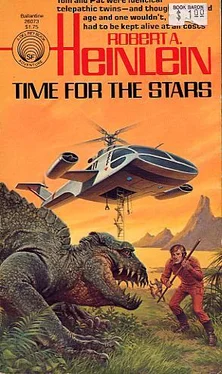Robert Heinlein - Time For The Stars
Здесь есть возможность читать онлайн «Robert Heinlein - Time For The Stars» весь текст электронной книги совершенно бесплатно (целиком полную версию без сокращений). В некоторых случаях можно слушать аудио, скачать через торрент в формате fb2 и присутствует краткое содержание. Жанр: Фантастика и фэнтези, на английском языке. Описание произведения, (предисловие) а так же отзывы посетителей доступны на портале библиотеки ЛибКат.
- Название:Time For The Stars
- Автор:
- Жанр:
- Год:неизвестен
- ISBN:нет данных
- Рейтинг книги:3 / 5. Голосов: 1
-
Избранное:Добавить в избранное
- Отзывы:
-
Ваша оценка:
- 60
- 1
- 2
- 3
- 4
- 5
Time For The Stars: краткое содержание, описание и аннотация
Предлагаем к чтению аннотацию, описание, краткое содержание или предисловие (зависит от того, что написал сам автор книги «Time For The Stars»). Если вы не нашли необходимую информацию о книге — напишите в комментариях, мы постараемся отыскать её.
Time For The Stars — читать онлайн бесплатно полную книгу (весь текст) целиком
Ниже представлен текст книги, разбитый по страницам. Система сохранения места последней прочитанной страницы, позволяет с удобством читать онлайн бесплатно книгу «Time For The Stars», без необходимости каждый раз заново искать на чём Вы остановились. Поставьте закладку, и сможете в любой момент перейти на страницу, на которой закончили чтение.
Интервал:
Закладка:
"The other thing that stands out," Dr. Devereaux went on, "is that neither you nor your brother wanted to go on this trip."
This was so manifestly untrue and unfair that I opened my mouth and left it open. Dr. Devereaux looked at me. "Yes? You were about to say?"
"Why, that's the silliest thing I ever heard, Doctor! The only real trouble Pat and I ever had was because both of us wanted to go and only one of us could."
He shook his head. "You've got it backwards. Both of you wanted to stay behind and only one of you could. Your brother won, as usual."
"No, he didn't... well, yes, he did, but the chance to go; not the other way around. And he would have, too, if it hadn't been for that accident."
" 'That accident." Mmm... yes." Dr. Devereaux held still, with his head dropped forward and his hands folded across his belly, for so long that I thought again that he was asleep. "Tom, I'm going to tell you something that is none of your business, because I think you need to know. I suggest that you never discuss it with your twin... and if you do, I'll make you out a liar, net. Because it would he bad for him. Understand me?"
"Then don't tell me," I said surlily.
"Shut up and listen." He picked up a file folder. "Here is a report on your brother's operation, written in the talk we doctors use to confuse patients. You wouldn't understand it and, anyhow, it was sent sidewise, through the Santa Maria and in code. You want to know what they found when they opened your brother up?"
"Uh, not especially."
"There was no damage to his spinal cord of any sort."
"Huh? Are you trying to tell me that he was faking his legs being paralyzed? I don't believe it!"
"Easy, now. He wasn't faking. His legs were paralyzed. He could not possibly fake paralysis so well that a neurologist could not detect it. I examined him myself; your brother was paralyzed. But not from damage to his spinal cord—which I knew and the surgeons who operated on him knew."
"But—" I shook my head. "I guess I'm stupid."
"Aren't we all? Tom, the human mind is not simple; .it is very complex. Up at the top, the conscious mind has its own ideas and desires, some of them real, some of them impressed on it by propaganda and training and the necessity for putting up a good front and cutting a fine figure to other people. Down below is the unconscious mind, blind and deaf and stupid and sly, and with—usually—a different set of desires and very different motivations. It wants its own way ... and when it doesn't get it, it raises a stink until it is satisfied. The trick in easy living is to find out what your unconscious mind really wants and give it to it on the cheapest terms possible, before it sends you through emotional bank ruptcy to get its own way. You know what a psychotic is, Tom?"
"Uh... a crazy person."
"Crazy' is a word we're trying to get rid of, A psychotic is a poor wretch who has had to sell out the shop and go naked to the world to satisfy the demands of his unconscious mind. He's made a settlement, but it has ruined him. My job is to help people make settlements that won't ruin them—like a good lawyer, We never try to get them to evade the settlement, just arrange it on the best terms.
"What I'm getting at is this: your brother managed to make a settlement with his unconscious on fairly good terms, very good terms considering that he did it without professional help. His conscious mind signed a contract and his unconscious said flatly that he must not carry it out. The conflict was so deep that it would have destroyed some people. But not your brother. His unconscious mind elected to have an accident instead, one that could cause paralysis and sure enough it did—real paralysis, mind you; no fakery. So your brother was honorably excused from an obligation he could not carry out. Then, when it was no longer possible to go on this trip; be was operated on. The surgery merely corrected minor damage to the bones. But he was encouraged to think that his paralysis would go away—and so it did." Devereaux shrugged.
I thought about it until I was confused. This conscious and unconscious stuff—I'd studied it and passed quizzes in it... but I didn't take any stock in it. Doc Devereaux could talk figures of speech until he was blue in the face but it didn't get around the fact that both Pat and I had wanted to go and the only reason Pat had to stay behind was because be had hurt himself in that accident. Maybe the paralysis was hysterical, maybe be had scared himself into thinking he was hurt worse than he was. But that didn't make any difference.
But Doc Devereaux talked as if the accident wasn't an accident. Well, what of it? Maybe Pat was scared green and had been too proud to show it—I still didn't think he had taken a tumble on a mountainside on purpose.
In any case, Doc was dead wrong on one thing: I had wanted to go. Oh, maybe I had been a little scared and I knew I had been homesick at first—but that was only natural.
("Then why are you so down in dumps, stupid?")
That wasn't Pat talking; that was me, talking to myself. Shucks, maybe it was my unconscious mind, talking out loud for once, "Doc?"
"Yes, Tom."
"You say I didn't really want to come along?"
"It looks that way."
"But you said the unconscious mind always wins. You can't have it both ways."
He sighed. "That isn't quite what I said. You were hurried into this. The unconscious is stupid and often slow; yours did not have time to work up anything as easy as a skiing accident. But it is stubborn. It's demanding that you go home... which you can't. But it won't listen to reason. It just keeps on nagging you to give it the impossible, like a baby crying for the moon."
I shrugged. "To hear you tell it, I'm in an impossible moss."
"Don't look so danged sourpuss! Mental hygiene is a process of correcting the correctable and adjusting to the inevitable. You've got three choices."
"I didn't know I had any."
"Three. You can keep on going into a spin until your mind builds up a fantasy acceptable to your unconscious • . .a psychotic adjustment, what you would call 'crazy.' Or you can muddle along as you are, unhappy and not much use to yourself or your shipmates... and always with the possibility of skidding over the line. Or you can dig into your own mind, get acquainted with it, find out what it really wants, show it what it can't have and why, and strike a healthy bargain with it on the basis of what is possible. If you've got guts and gumption, you'll try the last one. It won't be easy." He waited, looking at me.
"Uh, I guess I'd better try. But how do I do it?"
"Not by moping in your room about might-have-beens, that's sure."
"My Uncle Steve—Major Lucas, I mean"—I said slowly, "told me I shouldn't do that. He wants me to stir around and associate with other people. I guess I should."
"Surely, surely. But that's not enough. You can't chin yourself out of the hole you are in just by pretending to be the life of the party. You have to get acquainted with yourself."
"Yes, sir. But how?"
"Well, we can't do it by having you talk about yourself every afternoon while I hold your hand. Mmm... I suggest that you try writing down who you are and where you've been and how you got from there to here. You make it thorough enough and maybe you will begin to see 'why' as well as 'how.' Keep digging and you may find out who you are and what you want and how much of it you can get."
I must have looked baffled for he said, "Do you keep a diary?"
"Sometimes. I've got one along."
"Use it as an outline. 'The Life and Times of T. P. Bartlett, Gent.' Make it complete and try to tell the truth—all the truth."
I thought that over. Some things you don't want to tell anybody. "Uh, I suppose you'll want to read it, Doctor?"
Читать дальшеИнтервал:
Закладка:
Похожие книги на «Time For The Stars»
Представляем Вашему вниманию похожие книги на «Time For The Stars» списком для выбора. Мы отобрали схожую по названию и смыслу литературу в надежде предоставить читателям больше вариантов отыскать новые, интересные, ещё непрочитанные произведения.
Обсуждение, отзывы о книге «Time For The Stars» и просто собственные мнения читателей. Оставьте ваши комментарии, напишите, что Вы думаете о произведении, его смысле или главных героях. Укажите что конкретно понравилось, а что нет, и почему Вы так считаете.












